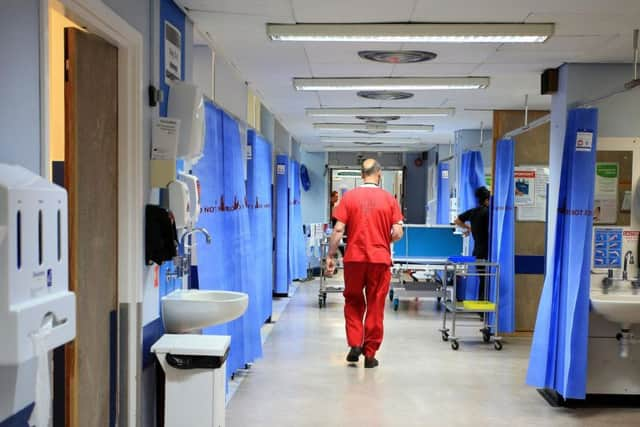General Election 2019: NHS as important as Brexit to voters finds new poll
The Ipsos Mori November 2019 Issues Index has seen the NHS climb by 18 percentage points since October, to 54 per cent, while Brexit has fallen as a voter priority by six points to 57 per cent this month.
Concerns about crime and pollution have also fallen while worry about education and the economy has spiked, the UK-wide poll has found.
Advertisement
Hide AdAdvertisement
Hide AdThe rise in the NHS as a focus for voters across the UK comes as the scandal around the Queen Elizabeth University Hospital in Glasgow continues to grow, with new revelations that the NHS Greater Glasgow and Clyde health board ignored legal regulations by failing to report the death of 10-year-old Milly Main to the Crown Office, despite alleged links to contaminated water at the Royal Hospital for Children.


And in Yorkshire images have emerged of a four-year-old boy with suspected pneumonia forced to sleep on the floor of Leeds General Infirmary for more than four hours because of a shortage of beds.
Labour has also accused Boris Johnson of being prepared to "sell off" the NHS to Donald Trump as part of a a UK-US trade deal once Britain leaves the EU, although Mr Johnson has denied the allegation.
The Conservatives have promised to spend £20.5bn a year more - in real terms - on the NHS by 2023/24, a 3.3 per cent annual increase according to the Institute for Fiscal Studies, while Labour's offer would see an increase of 3.8 per cent per year.
According to the pollsters the NHS is now seen as the most important issue facing Britons’ families, although Brexit is the pre-eminent issue influencing how people might vote.
New questions were added to the Ipsos Mori index last month to understand the public’s views on the importance of different issues to their families and to their vote. The poll found that almost four in ten say the NHS is one of the most important issues facing their family (36%), while Brexit ranks joint-second on 17 per cent with education (17%) and the economy (16%).
However Brexit remains the leading issue in determining how people will vote, with the NHS in second. Half of Britons say Brexit is one of the most important issues influencing their vote choice (48%), compared with 35 per cent who say the same about the NHS. The levels of public concern about Brexit and the NHS are now at a similar level for the first time since mid-2018.
The economy, frustration with politicians and education are all similarly ranked in third (15%, 13% and 13% respectively).
Advertisement
Hide AdAdvertisement
Hide AdThis month is also only the second time since April 1997 that two issues have scored over 50 per cent on the Issues Index at the same time.
Mike Clemence, Research Manager at Ipsos MORI, said: “The Issues Index appears to show a refocus in public concerns, coinciding with the campaign for this month’s election. While Brexit remains the biggest national concern, its importance has dipped somewhat and there has been a sharp growth in the proportion who see the NHS as a major issue for the country.
"Election time has also seen increases in the proportions concerned about the economy and education, while worry about crime and the environment has dipped.
"New questions on the index show that public priorities differ dependent on how issues are framed: while Brexit is the biggest concern nationally the NHS is considered the most significant issue for Britons’ families.
"However, when we ask which issue is the most important influence on how people might vote, half say Brexit and one third say it is the NHS”
Today the Liberal Democrats claimed that Brexit is already costing the government £380–470 million a week – money that the party says could have been spent on the NHS instead.
The Institute for Fiscal Studies has estimated that GDP is £55-£66 billion lower this year than it would have been without Brexit, mainly due to uncertainty deterring business investment.
Using the IFS figures, the Liberal Democrats have calculated that public sector receipts (which are 37% of GDP) are £20.3-£24.3 billion lower this year than they would have been, which equates to £380–470 million a week.
Advertisement
Hide AdAdvertisement
Hide AdScottish Liberal Democrat Campaign Chair Alex Cole-Hamilton said: “Boris Johnson’s lied his way through the referendum campaign and now we know the lie on the side of a bus was even bigger than we thought. Not only does Brexit not mean an extra £350 million a week for the NHS, it actually means £350 million a week less – and that’s before we’ve even left.
“If Boris Johnson wins a majority on Thursday, his disastrous hard Brexit will draw even more money out of our economy and our public services.
“That’s why every vote for the Liberal Democrats is a vote to stop Brexit, stop another divisive independence referendum and invest the £50 billion Remain Bonus from higher economic growth to build a brighter future.”